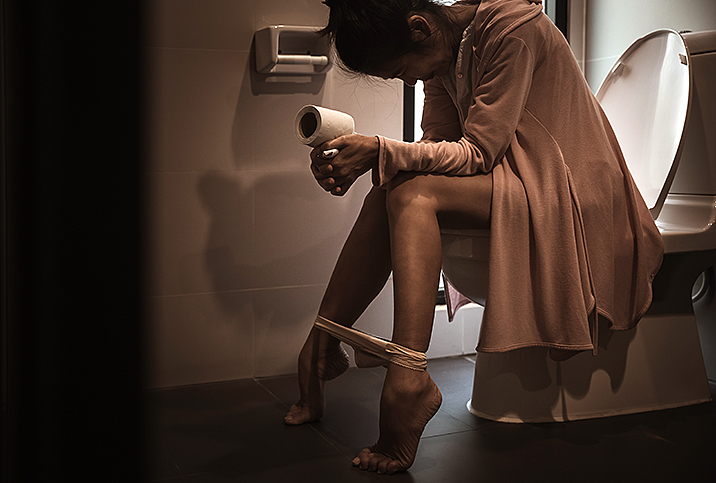Endometriosis: A Five-Year Struggle for Answers

It can take 7 to 10 years to be diagnosed with endometriosis, according to a 2015 study published in the British Journal of General Practice. My own experience was only a little bit shorter than that.
"The diagnosis can be delayed because patients think things are going to get better," said Dan Martin, M.D., gynecological consultant for the Endometriosis Foundation of America. "Patients think pain is normal. Their family, friends and [healthcare] providers tell them that pain is normal."
My search began in 2016 after repeated, severe fibromyalgia flare-ups that left me with intense muscle spasms, constipation, back pain, fatigue and headaches. Unfortunately, by the time I was able to see my doctor, the majority of my symptoms had subsided, so he didn't witness the extent of my symptoms, and thought I was seeking painkillers.
When the trouble began
I was prescribed antidepressants and referred for a psychological consultation. I felt ignored. This feeling is nothing new for patients suffering from chronic conditions, who are often told to make lifestyle changes that our symptoms prevent us from implementing.
I did my best to manage my lifestyle. I even switched to a plant-based diet and sought counseling to manage my stress, but nothing helped my pain, fatigue and constipation. After a year of monthly flare-ups, I returned to my doctor and demanded answers. I was labeled a hypochondriac, and was finally given a referral to a rheumatologist after I refused to leave his office without one.
The revolving doors of doctors' offices
For the next three years, I went from one specialist to another. They all agreed something was wrong but couldn't figure it out. My rheumatologist referred me to a neurologist, who ruled out multiple sclerosis, brain tumors and other degenerative diseases before falling back on the fibromyalgia diagnosis. Ultimately, the rheumatologist referred me to a gastroenterologist for my bowel symptoms because they believed my bowel problems were a sign of a separate condition.
I was diagnosed with irritable bowel syndrome with constipation (IBS-C). After reviewing my symptom documentation, my gastroenterologist was able to pinpoint a connection between my flare-ups and my menstrual cycle, so he referred me to a gynecologist, who was offended the gastroenterologist would make a gynecological recommendation and showed me the door.
Once again, I had been ignored. According to Monika Bettney, a specialist in gastroenterology and a women's health dietitian, for patients with endometriosis, this pattern of referrals can have devastating psychological impacts. "Any chronic condition that gives people grief will cause mood disorders," she explained. "It seems fairly obvious that patients who are in pain, and it takes 10 years to be diagnosed, and were looked at as crazy or needy or attention-seeking—I think most people would struggle."
It was at this point I started researching on my own and learned about endometriosis. This time, I sought out a new gynecologist. Within five minutes of my appointment, the physician's assistant agreed it was likely endometriosis. An ultrasound revealed cysts on my ovaries but not endometriosis, which is typical as most diagnostic tests will not show this condition.
'Patients think pain is normal. Their family, friends and [healthcare] providers tell them that pain is normal.'
After discovering the cysts, my doctor performed a laparoscopy to remove them and search for endometrial lesions. Once inside, my doctor found adhesions that attached my uterus to both my abdominal wall and my bladder, multiple endometrial cysts engulfing my right ovary and endometrial implants on my uterus and left abdominal wall.
This surprise diagnosis is common in patients with endometriosis. Martin explains, "There are no useful blood tests, ultrasounds or MRIs for average cases. For late cases with large (deep) nodules, ultrasounds and MRIs are often useful. Blood tests can be used to monitor recurrence, but not to make a diagnosis."
Though my doctor didn't find any obvious implants on my bowels, my gastroenterologist is convinced endometriosis is the cause of my IBS. Martin confirms it's nearly impossible to find every endometrial implant, and once endometriosis is discovered, it is often assumed that implants are elsewhere in the body. "Endometriosis can be difficult to see at surgery because it can be small, hidden behind adhesions, hidden within tubes, hidden within ovaries, hidden within the bowel, hidden behind the peritoneum, covered by the bowel or omentum and more," he said.
I thought finding a diagnosis would be the most difficult part of this journey, but getting answers was just the start. There's no cure for endometriosis. Even worse, with so little research in this area, it's hard to manage symptoms. This causes some patients to try any treatment, regardless of how dangerous, out of desperation to alleviate the symptoms.
The real symptoms of endometriosis
The reality of endometriosis is that for most patients, we experience pain each day of our cycle, and this pain often leads to additional complications, such as generalized fatigue, muscle pain, leg spasms, abdominal cramping, bowel disturbances and difficulty urinating. In my case, once I was diagnosed, I traced my symptoms back and realized I've likely had endometriosis since I was a teenager. I hadn't thought there was a problem because I assumed everyone who had a period experienced the same issues.
With so many symptoms, it's common for endometriosis to have secondary chronic conditions. Following my surgery, my symptoms returned by my next menstrual cycle. Many people ask if all the hassle was worth it. The truth is, knowing my symptoms are real gives me peace of mind, but it doesn't change how little my family, friends and doctors understand my daily pain. Knowing the root of my symptoms did, however, change my medication, lifestyle and dietary recommendations, which ensures my treatment plan meets the specific needs of my chronic conditions.

















